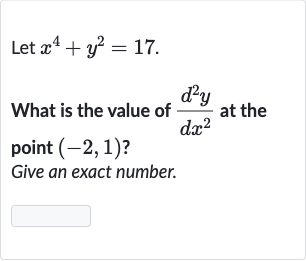Full solution
Q. Let .What is the value of at the point ?Give an exact number.
- Differentiate Equation: Differentiate both sides of the equation with respect to .Using the power rule for differentiation, the derivative of with respect to is , and the derivative of with respect to is since is a function of . The derivative of a constant is .So, the differentiation gives us .
- Solve for : Solve for . From the previous step, we have . Rearrange the equation to solve for : . Now, divide both sides by to isolate : . Simplify the equation: .
- Differentiate : Differentiate both sides of the equation again with respect to to find . Using the quotient rule for differentiation, which is , where and , we get: .
- Substitute : Substitute the value of from Step into the equation from Step .We have .Simplify the equation: .
- Substitute Point: Substitute the point into the equation from Step .We have .Calculate the values: .Simplify the equation: .
- Calculate Final Value: Calculate the final value of at the point . We have . Simplify the equation: .
More problems from Operations with rational exponents
QuestionGet tutor help
QuestionGet tutor help

